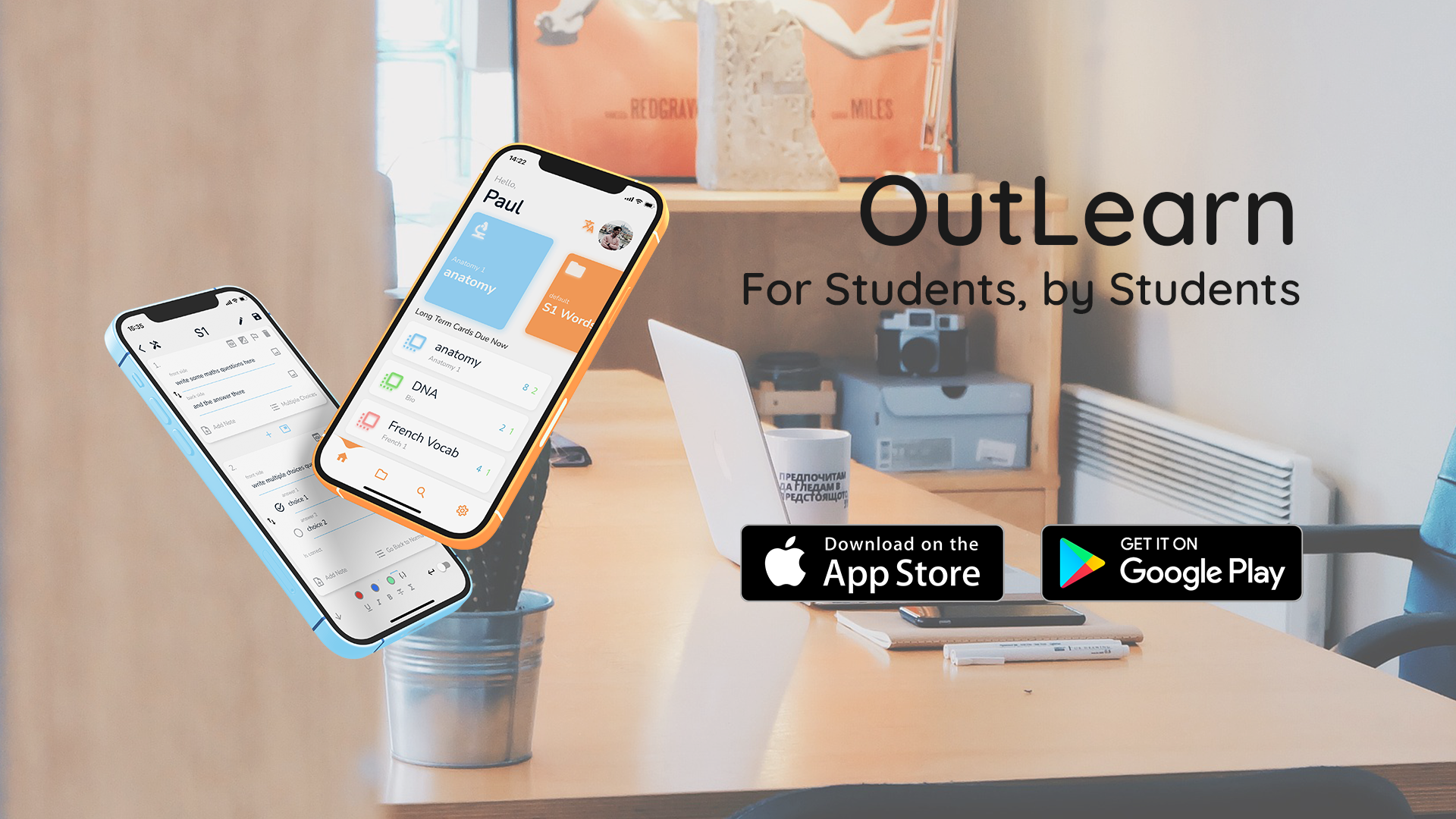Top 5 Best Flashcards Apps for 2024
Flashcards have become an essential tool for students, professionals, and lifelong learners. In the sea of apps available, finding the right flashcard tool can be challenging. Here are the top 5 flashcard apps, with one clear standout: OutLearn Flashcards.

1. OutLearn Flashcards
OutLearn Flashcards, developed by a medical student, is a comprehensive app designed to meet the learning needs of students across various fields, from science and medicine to mathematics and humanities. With powerful features, seamless usability, and no hidden costs, it’s the perfect app for all learners.
Pros:
- Offline support: Study anywhere without the need for an internet connection.
- Short-term learning feature: Great for last-minute cramming or focusing on recent topics.
- Spaced repetition feature: Master content over time using a scientifically proven learning technique.
- No ads on the free version: A completely distraction-free learning experience.
- No subscription model: One-time purchase or completely free, with no need for monthly payments.
- Image occlusion to learn diagrams: Perfect for subjects like anatomy and biology, where visual learning is key.
- LaTeX support for maths: Write complex mathematical equations easily.
- Dark mode: Study comfortably in low-light environments.
- Easy to use: Simple, intuitive interface that doesn’t overwhelm.
- Syncs across devices seamlessly: Whether you’re on a tablet, phone, or computer, your progress follows you everywhere.
OutLearn Flashcards combines all the most essential learning features into one app without compromising ease of use. For students who need both flexibility and power, OutLearn is the go-to app.
2. Quizlet
Quizlet is one of the most popular flashcard apps out there, with a massive user base and lots of pre-made decks across a wide variety of subjects. However, while it offers great content discovery and basic flashcard features, it falls short in key areas compared to OutLearn.
Pros:
- Large community with many user-generated decks.
- Multiple study modes like “Learn” and “Match” games.
- Flashcards can include images and audio for richer learning.
Cons:
- Subscription model: Many of its core features, like offline mode and advanced learning tools, are locked behind Quizlet Plus, a paid subscription.
- Ads in the free version: The free version has intrusive ads that can disrupt study sessions.
- No LaTeX support: Not ideal for students who need to study complex mathematical equations.
- No true image occlusion: Diagram-heavy learners, such as medical students, won’t find the same support here as in OutLearn.
3. Anki
Anki is beloved by many learners, particularly for its advanced spaced repetition algorithm. However, while it’s powerful, Anki’s interface and usability leave much to be desired, especially for new users.
Pros:
- Spaced repetition: A robust algorithm helps learners retain information long-term.
- Highly customizable: You can tweak nearly everything, from card formatting to learning schedules.
- Large community: Lots of user-generated decks are available to download.
Cons:
- Steep learning curve: Anki’s user interface can be difficult to navigate, particularly for beginners.
- No short-term learning mode: While great for spaced repetition, Anki isn’t well-suited for cramming.
- No built-in syncing: While it can sync across devices, setting this up can be complicated compared to OutLearn’s seamless experience.
- Paid app for iOS: Anki is free on most platforms, but iOS users have to pay a high price.
- Outdated UI: While functional, Anki’s interface feels outdated compared to the sleek design of OutLearn.
4. RemNote
RemNote is a flashcard tool designed with knowledge retention in mind, blending note-taking and flashcards into one. While it’s a strong option for learners who like to take comprehensive notes, it lacks some core flashcard functionalities.
Pros:
- Note-taking and flashcards combined: Great for students who like to generate flashcards directly from their notes.
- Spaced repetition: Like Anki, it uses spaced repetition to help you retain information over time.
- Hierarchical flashcards: Helps break down complex topics into smaller chunks.
Cons:
- Subscription model: Many advanced features, like image occlusion and offline support, require a paid plan.
- No image occlusion in the free version: Diagram learning is locked behind a paywall, unlike in OutLearn where it’s free.
- No LaTeX support: Not as useful for subjects like mathematics and engineering.
- Complex interface: While powerful, the interface can be overwhelming for those who just want to study flashcards quickly.
5. StudySmart
StudySmart is another flashcard app built with spaced repetition at its core. While it’s effective for students looking to build long-term memory, it doesn’t offer many of the features that modern learners demand.
Pros:
- Spaced repetition: Helps learners focus on material that needs the most review.
- Simple interface: Easy to use for beginners.
Cons:
- Subscription model: Many essential features require a subscription.
- Limited feature set: No image occlusion, LaTeX support, or advanced customization options.
- No short-term learning mode: It’s purely built for spaced repetition, without flexibility for cramming.
Conclusion: OutLearn is the Best Flashcard App for All Students
While all of the apps in this list offer some great features, OutLearn Flashcards stands out as the best all-around app for learners. Whether you need offline access, advanced learning features, or an ad-free experience, OutLearn provides it all without the hassle of subscriptions or hidden costs. It’s the ideal app for learners who need flexibility, power, and ease of use across any subject.